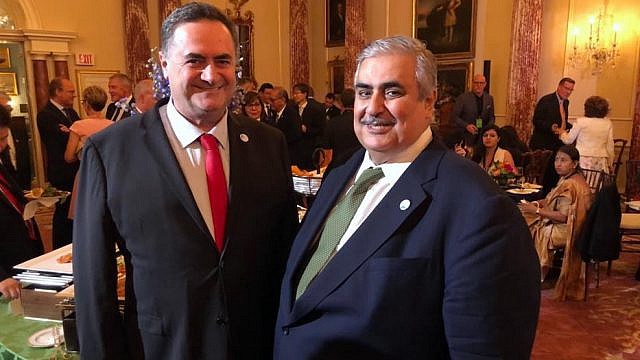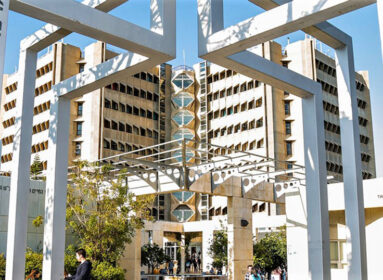
By Israel Kasnett
(JNS) Israel often sits at the center of attention in the Middle East, blamed for most of the troubles plaguing the region. But lately, instead of being viewed as the problem, it is slowly gaining more acceptance as being part of the solution.
On July 18, Israeli Foreign Minister Israel Katz sent out a surprise post on his Twitter account, including an image of himself with Foreign Minister of Bahrain Khalid Al Khalifa. In the post, Katz wrote: “Yesterday, I met publicly with the Foreign Minister of Bahrain @khalidalkhalifa at the @statedept Ministerial on Religious Freedom. Another example of our growing diplomatic connections.”
Such a meeting between a senior Israeli and Arab official, particular from one of the Gulf states, would have been unheard of only a few years ago. And indeed, many were still shocked to see such a public display of relations. Nevertheless, for Israeli experts and insiders, the meeting between Katz and Al Khalifa wasn’t that surprising—just another logical next step in increasingly diverse diplomatic associations between Israel and the larger world.
Omer Dostri, a research fellow at the Jerusalem Institute for Strategy and Security, told JNS that the reason relations between Israel and Bahrain have warmed in recent years is “based on a common interest in curbing the Iranian threat in the fields of military nuclear development, the ballistic-missile project, and Iran’s hostile and subversive activities in the Middle East.”
Al Khalifa spoke with Israel’s Channel 13 last month on the sidelines of the Trump administration’s Mideast peace conference in Manama and, amazingly, called for open communication with Israel. In his first-ever interview with an Israeli channel, Al Khalifa said: “Israel is a country in the Middle East. Israel is part of this heritage of this whole region historically. So the Jewish people have a place amongst us. So communication needs to be a prerequisite for solving all the dispute. We should talk.”
At the same time, Bahrain recently confirmed that Manama is preparing to host a meeting on maritime and air-navigation security possibly in October, in cooperation with the United States and Poland, with the participation of more than 60 countries. Israel is likely to be one of them.
But does the Gulf state want something from Israel in return for all of this public showcasing?
Dostri told JNS he believes that “as part of the development of the relations between the two countries, Bahrain will likely want to see some progress in relations between Israel and the Palestinians.”
‘More outreach between Israel and Gulf states’
Alternatively, Varsha Koduvayur, a senior research analyst at the Foundation for Defense of Democracies in Washington, D.C., told JNS that as of now, Bahrain is not demanding anything for improved relations with Israel.
She said, “There’s a growing awareness among Gulf states that Israel will be a good partner and ally for them to bolster regional security against the persistent Iranian threat.”
She added that the Persian Gulf states “are also aware of the economic benefits that can be generated by bringing Israel into the fold.”
Indeed, earlier this month, the head of the Mossad, Yossi Cohen, announced that Israel was renewing ties with Oman. “Just recently, renewal of formal relations with Oman was declared and the establishment of a representative office of the foreign ministry in that country,” he said.
In 2018, Israeli Prime Minister Benjamin Netanyahu traveled to Oman, where he held talks with Sultan Qaboos bin Said in Muscat.
Looking forward, Koduvayur said she expects “more outreach between Israel and Gulf states,” but that there is a long way to go before any official diplomatic recognition.
She said for the time being, that “may be a step too far, given that several Gulf states have publicly tied themselves to supporting the Palestinians. Short of any major improvements in the Israeli-Palestinian issue, I don’t think any Gulf state would be able to normalize with Israel.”
Main Photo: Israeli Foreign Minister Yisrael Katz (left) meets with and Bahraini Foreign Minister Khalid bin Ahmed Al Khalifa at the U.S. State department’s Ministerial on Religious Freedom on July 18, 2019. Credit: Yisrael Katz/Twitter.







 Southern New England Jewish Ledger
Southern New England Jewish Ledger















